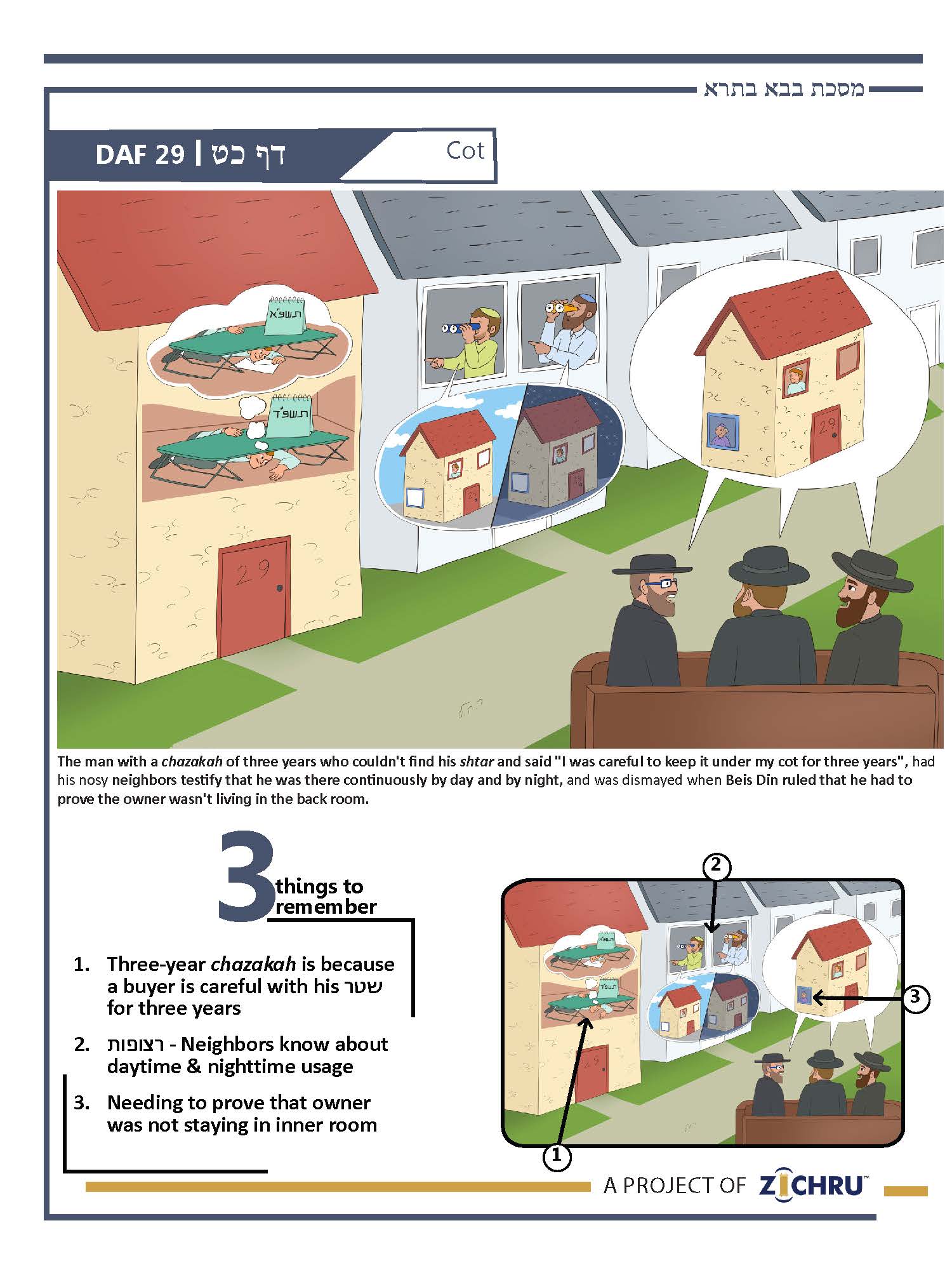Bava Basra - Daf 29
- Audio Timestamps
0:00 - The 3 Sugyos
2:46 - Review of 3 Sugyos
5:24- Siman
8:19 - 4 Blatt Back Chazarah
16:21 - Pop Quiz (Last 7 blatt)
- For access to all Zichru resources including PDFs, and illustrations CLICK HERE
- Three-year chazakah is because a buyer is careful with his שטר for three years
Rava offers two explanations for the basis of a three-year chazakah, but Abaye rejects both. Finally, Rava explains: שתא קמייתא מיזדהר איניש בשטריה –the first year after purchasing property, a person is careful with his שטר; תרתי ותלת מיזדהר – the second and third year, he is still careful with it. טפי לא מיזדהר – Longer than that, he is not careful with his שטר if his ownership was not challenged. Therefore, the new occupant is believed that he purchased the property and misplaced the שטר, unless the previous owner challenged him during the three years. Abaye asked Rava that if so, מחאה שלא בפניו לא תיהוי מחאה – a protest made not in [the occupant’s] presence should not be a valid protest, because the occupant can say that if he would have protested in the occupant’s presence, he would have guarded the שטר for longer!? The Gemara answers that the former owner can respond: חברך חברא אית ליה – your friend has a friend, וחברא דחברך חברא אית ליה – and your friend’s friend has a friend, and you were sure to hear about my protest.
- רצופות
Rav Huna ruled about a chazakah of three years: הוא שאכלן רצופות – it is only effective if he used [the properties] for three years consecutively. Although the Mishnah taught that three full years are required, that may have only excluded incomplete years, but מפוזרות – three years scattered over a longer period may have also qualified, so Rav Huna taught otherwise. The Mishnah taught that a chazakah for houses is established in three years. But since witnesses would not know if the occupant remained there at night, how can a chazakah be established?! Abaye answered that the normal witnesses to a house’s chazakah are neighbors; שיבבי מידע ידעי ביממא ובליליא – neighbors certainly may know about daytime and nighttime usage. Rava explains the case is where two witnesses came forward and testified that they themselves rented the house from the current owner and resided there day and night (the Gemara questions the validity of such testimony). Rav Huna agrees בחנותא דמחוזא – regarding the stores of Mechuza that an occupant is not required to prove that he used the store at nighttime during the three years, because it is not made for nighttime use.
- שכוני גוואי, זיל ברור אכילתך
The Gemara records a case where one claimed to have occupied a house for three years, but the former owner responded: אנא בשכוני גוואי הואי – “I was in the inner rooms of that house during the three years,” and would pass through the outer rooms where the occupant was, using the area together with him, and therefore did not protest. The case was brought before Rav Nachman, and he told the occupant: זיל ברור אכילתך – Go prove your exclusive use of the house by providing testimony that you resided there alone for three years. Rava argued that the law should be המוציא מחבירו עליו הראיה – the one seeking to exact payment from his fellow, the burden of proof is upon him. Rava holds that since the occupant provided testimony that he lived there for three years, we assume he did so alone and his chazakah is established, and the former owner must provide proof to undermine it. The Gemara poses a contradiction of these two opinions, and in its answer, further explains that Rav Nachman holds a chazakah is no better than if he were holding a שטר to prove his purchase: מי לא אמרינן ליה – do we not tell him, קיים שטרך וקום בניכסי – “First verify your שטר’s legitimacy, and then stand in the property as its owner”?
Siman - Cot
The man with a chazakah of three years who couldn't find his shtar and said "I was careful to keep it under my cot for three years", had his nosy neighbors testify that he was there continuously by day and by night, and was dismayed when Beis Din ruled that he had to prove the owner wasn't living in the back room.


